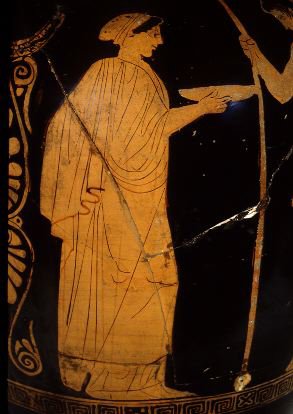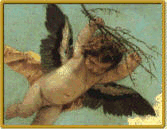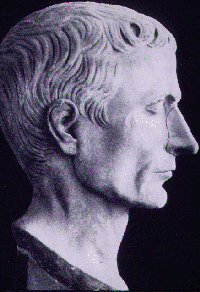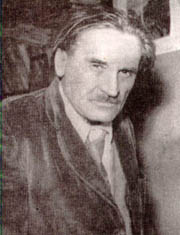Presents a summary of:

|
ENVY by Yuri Olesha (1927) |

|
|
|
1. Andrei Babichev, a healthy horse of a man, does his early morning calisthenics with zest and enthusiasm, while his house guest, Nikolai Kavalerov, sullenly tries not to notice. Babichev is as ardent in his washing up and gargling. He sings happily.
Things don't like Kavalerov. Furniture tries to trip him up. His relations with his blanket are complicated. However, things do like Babichev. He is a fancy dresser and uses eau de cologne. He eats heartily and with great relish. He is the Director of the Food Industry Trust, and a People's Commissar once called him, "a most outstanding citizen".
2. Comrade Babichev is in charge of everything about food. He loves his work and would do every detail on his own, if he could. He gave birth to the idea of the "Quarter", which will be the biggest, greatest cafeteria ever. A two-course meal there will cost only 25 kopecks. He wants to see the industrialization of kitchens. He was responsible for the development of our first-class Soviet vegetable cleaning machines.
Once he paid an unannounced visit to an apartment kitchen in a workers district. He basically just got in everyone's way. The soup got oversalted, a glass was broken. So he left without telling them the great plans he had for their future kitchens: potatoes that peel themselves.
At his office, he is busy all day with meetings on fish-smoking, packaging, transportation, supplies from the countryside; considering names and labels for new chocolate bars; and worrying about the size of peas that are served. Then off he rushes to the Supreme Soviet for Agriculture.
3. In the evening, Babichev works at home. Kavalerov feels like a bystander. Babichev laughs at someting in his paperwork, but Kavalerov doesn't understand. He listens to Babaichev's laughter like a blind man listening to exploding fireworks.
Sometimes Kavalerov relays telephone messages for Babichev. At these moments, he is pleased to have even an indirect part in the affairs of the Food Trust.
 The mother and wife of Oedipus. Learn more at: Jocasta and Her Impact on Greek Culture |
Babichev asks unexpected questions such as, "Who is Jocasta?" Kavalerov wants to blurt out that he won't answer inane questions, but he lacks the courage to do so.
4. Two weeks ago, Kavalerov was in a bar. He got drunk and launched into a tirade in which self-destruction and aggressiveness were fused. He got thrown out of the bar and into the gutter. Babichev saw him there, and feeling sorry for him, brought him home. He offered to let Kavalerov stay with him and even offered him a small job of editing.
5. One evening, Kavalerov notices a photo of a swarthy young man on Babichev's desk and asks about it. It is Volodya Makarov, 18 years old, a first-class football player. It is he who used to sleep on Babichev's sofa, but now he's off studying. Ten years ago, Babichev was being held down on an anvil by some thugs who were ready to smash him in the face with a hammer, but Volodya saved his life. When Volodya returns, Kavalerov will have to surrender the sofa to him.
Someone down on the street calls out to Babichev. It is Babichev's younger brother, Ivan, whom Babichev denounces as a son of a bitch and scum. Ivan, wearing a bowler hat, shouts up that he has invented a machine called Ophelia.
6. Thinking that Babichev is not listening, Kavalerov rambles on, complaining that here in the Soviet Union there is no path to individual success, no chance to become famous. Kavalerov wants his own glory. He wishes that he had been born in a small French town so that one day he could just set out for the capital where he would, by frantic effort, achieve his goal of fame. He says he feels like just going out into a public square and doing something of genius, something absurd that would be a personal statement. Whe, he might even, for no reason, commit suicide and hang himself at the entrance to Babichev's house. Babichev unexpectedly advises that Kavalerov might better hang himself from the arch at the commissariate of the National Economy--it would be much more impressive.
Kavalerov is 27 years old, just as old as the century. He fears that he has become just like his father, too old to ever become handsome and famous. At his old apartment house, there was a fat, 45-year-old widow, Anechka Prokopovich, who used to look at him lustily, invitingly. This insulted Kavalerov, who dreamed of young, beautiful girls.
|
|
7. One day, Kavalerov follows Ivan, who is walking down the street with a pillow. He stops at an apartment building and calls up to Valya, a girl about 16 years old, in a second story window. Ivan shows her the pillow and says it's the one she used to sleep on and asks her to come back to live with him. She says nothing, so Ivan starts to leave. Then Valya says, "Wait, Daddy!" She hurries downstairs, but Ivan runs away. Valya, looking for Ivan, hurries past Kavalerov, who tells her, "You passed me with the rustle of a bough full of flowers and leaves."
That night, Valya calls Babichev. Kavalerov overhears as she tells him of her encounter with Ivan. Babichev laughs. She also tells him about the stranger talking of "leaves and flowers". Babichev laughs even louder.
8. Babichev is very excited. He is holding a new prototype salami. He gives it to Kavalerov and tells him to take it to Shapiro at the storage house. Shapiro examines the salami, smells it, and tastes a piece. He, too, is excited. It's tasty, doesn't go smelly after a day, and will cost only 35 kopecks.
Kavalerov is morose. He doesn't understand the excitement over salami. He wishes he could shine in glory like Babichev is shining today, but a stinking salami won't do it for Kavalerov.
|
(1996-1770)  Venician Artist. Learn more at: 300 Years of Tiepolo |
During the feast Babichev says the sausages produced in the Soviet Union are rotten, all dried up. He pledges to genuine, juicy pork sausages.
9. Babichev brings Kavalerov along as he goes to an airfield to witness the test of the latest Soviet airplane. Everyone gathers around Babichev, listening like schoolchildren to what he says. Disgusted, Kavalerov skulks off to a neaby restaurant and orders a beer. He notes that aiplanes look like fish, not birds. The Commissar for War shows up, and every snaps to attention, a band plays. Kavalerov wants to rush back onto the field, but he doesn't have an official invitation, so the soldier won't let him pass. Kavalerov acutely feels how isolated he is from the grand, important events and people.
10. After the air show, Kavalerov tries to catch up with Babichev at the Quarter construction site, but Babichev moves too fast.
11. Kavalerov decides not to go back to Babichev. He sleeps in the park and, in the morning, he writes an insulting letter to Babichev, calling him an empty shell, ignornant and stupid. He says that Babichev is trying to crush Kavalerov as he no doubt tried to crush the young football player Volodya. The letter also accues Babichev of wanting to seduce his neice, Valya. Kavalerov declares war on Babichev and writes that not only will he stop Babichev's evil plans, but he, Kavalerov, will marry Valya.
12. Kavalerov arrives at Babichev's apartment. Babichev is not home. Kavalerov leaves the letter on the desk. There is a knock at the door and Volodya Makarov enters. Kavalerov tells Volodya to flee while he can, that Babichev only wants to ruin them all. Volodya, of course, doesn't have the slightest idea what Kavalerov is talking about. He picks up the phone to call Babichev's office. Kavalerov grabs his letter and flees.
13. Outside, Kavalerov sits on a bench and sees that he took the wrong letter. He is holding a letter Babichev received recently from Volodya. In the letter, Volodya jokingly tells Babichev to kick Kavalerov out of the apartment. Volodya also writes that he is striving to become a human machine, working tirelessly without a single unnecessary wriggle. He also says that he has been picked to play on the Moscow football team in the upcoming match against Germany and that he will probably be on the USSR squad, too. Volodya also writes of his plans to marry Valya. He and Valya have an agreement that they will kiss for the first time at the inauguration of the Quarter.
|
|
14. Kavalerov returns to the apartment. Babichev opens the door. The first and only thing he says to Kavalerov is, "Get out of here!" Kavalerov sees that Volodya and Valya are there. Kavalerov tells Volodya that Babichev has been having an affair with Valya. Kavalerov receives a powerful punch and is thrown out of the apartment. Kavalerov vows to himself, "I will kill you, Comrade Babichev."
15. It is raining. Kavalerov walks through Moscow, noticing details of the wonders of life brimming all around him. He sees a mirror and gazes at his reflection, pondering that fact that in mirrors one can never properly guess directions. Suddenly, a small man in a bowler hat appears in the mirror. Still thinking of optical illusions, Kavalerov asks the man, "Which side did you come from?" The man replies, "Where from? I have invented myself." Only then does Kavalerov recognize the man as Ivan Babichev. He grabs Ivan's hand and desperatedly asks him, "What is Ophelia?"
PART TWO
1. The approach of old age did not frighten Ivan Babichev. Still, he would sometimes complain--cheerfully, and not seriously--that he had stomach cancer or arthritis.
There originally had been three Babichev brothers. The oldest, Roman, joined a revolutionary organization and was executed for terrorists acts. The youngest, Andrei, emigrated abroad.
|
Pompey the Great clash in:  The Battle of Pharsalus |
Ivan's next supposed invention was soap bubbles that would grow to the size of a hot-air balloon. Ivan's father, of course, didn't believe in this invention either, but he looked up in the sky and saw a large orange sphere the size of a hot-air balloon. This scared Ivan's father. What he didn't know and what Ivan did know was that this was the balloonist Ernesto Vitollo flying over the city.
On another occasion, Ivan helped a student get vengence when he was prevented from seeing his love by the girl's aunt. Ivan gave the aunt a supposed wart-removing remedy. But what it really did was make a wild blue violet grow out of the wart. At least, this is what Ivan says.
Later, in the same year that Roman was executed, Ivan graduated from the Petersburg Polytechnical Institute. He worked as an engineer at the Naval Plant in Nikolaev, near Odessa, until 1914.
|
|
After one of his usual sermons, Ivan was thrown out of the bar, and they pulled his bowler hat down over his eyes as further insult. Drunk, Ivan went to see his brother Ivan Babichev. Ivan talked about his "Ophelia" machine, in which, of course, Andrei did not believe. Ivan promised to destroy his brother with the Ophelia machine. Further, Ivan said he knows that Andrei wants to hand Valya over to Volodya, to breed a new species. But, Ivan says, he will strangle Valya before he lets that happen.
3. Many rumors sprang up about Ivan. According to one, he showed up at a wedding and advised the bride and groom not to get married, that they would only give birth to their own doom. The groom wanted to punch Ivan, and the bride fainted. At that moment, it is said, all the wine turned into water.
Another time, when Andrei was driving along the street, Ivan leapt in front of the car, forcing it to stop. Ivan was arrested. During questioning by the police, Ivan said he was the King of Banality, the leader of a conspiracy of feelings. Ivan believed that in the era of socialism, most human feelings--pity, tenderness, pride, jealousy, love--will vanish. Before then, Ivan wants to gather around him an army of examples of these old-world decadants. He says he has found a perfectly vainglorious, thoughtless man; a man who loves glory and whom he will urge on to perform a deed so filled with vile vanity, it will disgust spectators. That man is Nikolai Kavalerov, the Envious.
4. After their first meeting at the mirror, Ivan and Kavalerov went out for a drink. Although he didn't mention Andrei Babichev by name, Kavalerov told Ivan that he had just been thrown out by some big-wig. Ivan immediately recognized Kavalerov as one of the insulted and humiliated, who feels that others have prevented from his gaining his rightful success. Ivan saw Kavalerov as a clot of envy in the bloodstream of the dying era. He says that although Ivan and Kavalerov are ultimately doomed, Kavalerov must avenge himself, kick up a row just to spite history and the new era. He also says he had hoped that his daughter, Valya, would have joined him in the crusade, but she has deserted him for the new era.
Ivan tells a story from his childhood. When he was thirteen years old, he was used to admiration and an enthusiastic following. But there was a beautiful, charming, talented twelve-year-old girl, with ruffles and curls, ribbons and bows, pink satin dress. She outdanced and outsang everyone; she received the best presents, the best compliments. Hating and loving the girl at the same time, consumed with envy, Ivan attacked her, mussing her curls, scratching her face, ripping her dress. He had hoped to dishonor her, but Ivan was the one who was kicked out of the party and dishonored. However, Ivan had the satisfaction of knowing that he had ruined the party and that we was remembered. Everywhere the girl went, Ivan was remembered. Ivan's attitude to the new era is the same. The new era is like a brilliant carnival, which Ivan loves, but which he hates at the same time because he is not allowed to attend.
Ivan tells Kavalerov to kill his enemy. He says that he will annihilate his own enemy with Ophelia. The police come to arrest Ivan. Before going off to jail, Ivan tells Kavalerov to go see Valya.
5. At night, Andrei Babichev works and looks thoughtfully at the sleeping Volodya, who perhaps will be a new James Watt and invent some new machine. Perhaps Babichev loves Volodya both as a son and as a personification of the new world. When he was young, everyone liked Volodya, which Volodya often thought was undeserved. He tried to compensate his less successful friends by showing his attachment to them, by being ready for sacrifice and fervent displays of friendship. This incited his friends to emulation.
Volodya also felt that if everyone were a technician, wickedness, vanity, and other petty feelings would disappear, because time is a technial concept and these feelings cannot last long. There is also a pattern to lofty feelings. Certainly, the Revolution was cruel in the short run, but it was magnanimous as pertains to a wider scope of time. Volodya also dreamed of forming an army of new engineers, surgeons, professors, and inventors to teach the old bourgeois world a lesson.
|
|
Ivan takes Kavalerov to a trash heap in the suburbs, promising to show him the Ophelia machine. Ivan boasts that it is the most wonderful machine, capable of accomplishing miraculous tasks. But Ivan has purposely perverted the machine, preventing it from doing anything useful. This he did to spite the new era, which will come begging for the machine. The machine, however, will turn out to be a liar, it will stick its tongue out at the new era.
They reach a fence and peer in a chink. Suddenly, a loud whistle is heard. Ivan and Kavalerov take fright and quickly run away. Ivan keeps muttering, "I'm afraid of it. She hates me. She's betrayed me. She'll kill me."
Kavalerov realizes that the whistling was just a boy standing on the fence. Also, he is sure that no Ophelia machine really exists. Ivan tells Kavalerov a fictional tale:
|
. . . . He [Andrei] wants to turn you into homeless tramps, roaming the wilderness of history. Wives, he is spitting into your soup. Mothers, he dreams of wiping family resemblances from your babies' little faces, the beautiful, sacred family resemblance. He violates your lilttle secret corners, scurries like a rat along your shelves, pokes under your bed, crawls under your shirts, sniffs at the hair of your armpits. You must send him to hell! See this pillow? I am the king of pillows. Tell him: We wish to sleep, each of us on her own pillow. Don't you dare touch our pillows! Our heads have rested on them, our kisses have fallen on them during our nights of love, we have died on them and those whom we have killed have died on them, too. Keep your hands off our pillows! Stop calling to us! Stop beckoning to us, trying to lure us! What can you offer us to replace our capacity to love, to hate, to hope, to cry, to pity, to forgive? See this pillow? It is our coat of arms. Our symbol. Bullets get buried in a pillow. With a pillow we shall smother you." |
A large celebration is taking place in front of the Quarter. Andrei Babichev, famous and respected, addresses the crowd. He speaks of the future activities of the Quarter...the number of meals it will serve, its nutritional coefficient, special children's meals, etc. When Andrei is finished, Ivan, carrying a pillow, climbs onto the platform demanding the right to speak. He denounces Andre and the Quarter, saying it is an attempt to destroy, to sneer at the people's kitchens and their private, domestic lives. He brandishes his pillow, saying each person wants the right to sleep on their own pillow. And with this pillow, he promises to smother his enemies.
Ivan then summons up a shadowy figure on the scaffolding around the Quarter. It is his Ophelia machine, and it causes the Quarter to come crashing down. The people flee in panic. Andrei, smashed in the rubble and dying, admits defeat and begs permission to put his head on Ivan's pillow and to die there.
7. Ivan takes Kavalerov to see Valya. They find Valya and Volodya practicing high jumping in a field. They watch the young couple unobserved. Andrei arrives. Kavalerov wants to run away, but Ivan wants to stay and insult Andrei. Valya sees Ivan and moans. Ivan begs Valya to pluck out his eyes because he does not want to see the beauty of nature and youth. He tells Valya that he thought all feeling had perished, but he was wrong. Love, tenderness, devotion all remain, only not for Ivan. All he has left is envy.
Ivan tells Kavalerov that the conspiracy of feelings has failed, and that his machine will never exist. Kavalerov angrily reponds that youth is not passed and that, to prove it, he will kill Andrei Babichev tomorrow at the football match.
8. The next day, Kavalerov is in the grandstands for the football match between the Moscow team and a team from Germany. The German star, Getzke, is a true master. But he plays as an individual. He was there to display his individual art and was not concerned with the honor of the team. His hogging of the ball and running around on his own private schemes unbalanced the German attack. Volodya, the Soviet goalie, also plays brilliantly, knocking down shot after shot from Getzke. But, with ten minutes left in the first half, Getzke scores and the Germans move ahead.
9. At one point during the game, the ball is kicked up into the stands and lands at Kavalerov's feet. As is usual in these situations, all the spectators looked at Kavalerov and laughed. Kavalerov does nothing, so someone else picks up the ball and passes it to Andrei Babichev, who is sitting further down the row. Andrei, who has not recognized Kavalerov, throws the ball back down onto the field.
During halftime, Kavalerov sees Valya and Andrei standing with other fans who surround Volodya. Entranced with Valya's beauty, Kavalerov tries to tell her that he has waited all his life for her, but she does not hear him.
10. Kavalerov returns home drunk. He enters Anechka's room and finds her sitting on her bed. He approaches. She does not resist, in fact she opens her arms for him.
In the morning, Kavalerov awakens and is surprised to find himself in Anechka's bed. She tells him that he reminds her of her dead husband. Kavalerov slaps and beats Anechka. She says that her husband used to beat her, too. Kavalerov feels ills and lies in bed all day. Anechka puts a wet towel on his forhead, and at night sleeps next to him. During the night, Kavalerov awakens and sees Ivan standing over him.
11. In a delirous dream, Kavalerov sees Ivan attacked by the Ophelia machine, which pins him to a wall like a butterfly. The machine then comes after Kavalerov, who cries for pity and for Valya to save him.
12. Kavalerov was ill for three days. When he recovered, he jumped out of bed and got dressed. He is surprised to see that Anechka has repaired his suspenders. He runs out of the house. He realizes the extent of his degradation; that he had been irresponsible, too self-centered; that he had overestimated his own importance. He senses that he has come to a cataclysm, the line drawn between two ways of life. Now is his chance to cross the line and leave the repulsive, ugly life behind.
Kavalerov spends the night on the street. When he returns to Anechka's apartment, he finds Ivan sitting on the bed, drinking wine. Surprised, Kavalerov asks, "What does this mean?" Ivan responds, "It means nothing." Ivan notes that they used to talk about feelings but forgot the main one: indifference. Ivan says, "Indifference is man's best state." They can have peace and indifference here with Anechka. And, to cheer him up, Ivan tells Kavalerov that tonight is his (Kavalerov's) turn to sleep with Anechka.
 Olesha, Yuri Karlovich. Born 3 March (19 Feb, Old Style) 1899 in Elizavetgrad, Ukraine, the son of former land owner.
Family moved to Odessa in 1902. He began to write poetry in the
gymnasium. After graduation from the gymnasium, he enrolled in the law faculty at Novorossik University. At the same time, he participated in literary discussion groups in Odessa, along with Ilya
Ilf, Valentin Kataev, and Eduard Bagritsky.
Olesha, Yuri Karlovich. Born 3 March (19 Feb, Old Style) 1899 in Elizavetgrad, Ukraine, the son of former land owner.
Family moved to Odessa in 1902. He began to write poetry in the
gymnasium. After graduation from the gymnasium, he enrolled in the law faculty at Novorossik University. At the same time, he participated in literary discussion groups in Odessa, along with Ilya
Ilf, Valentin Kataev, and Eduard Bagritsky.